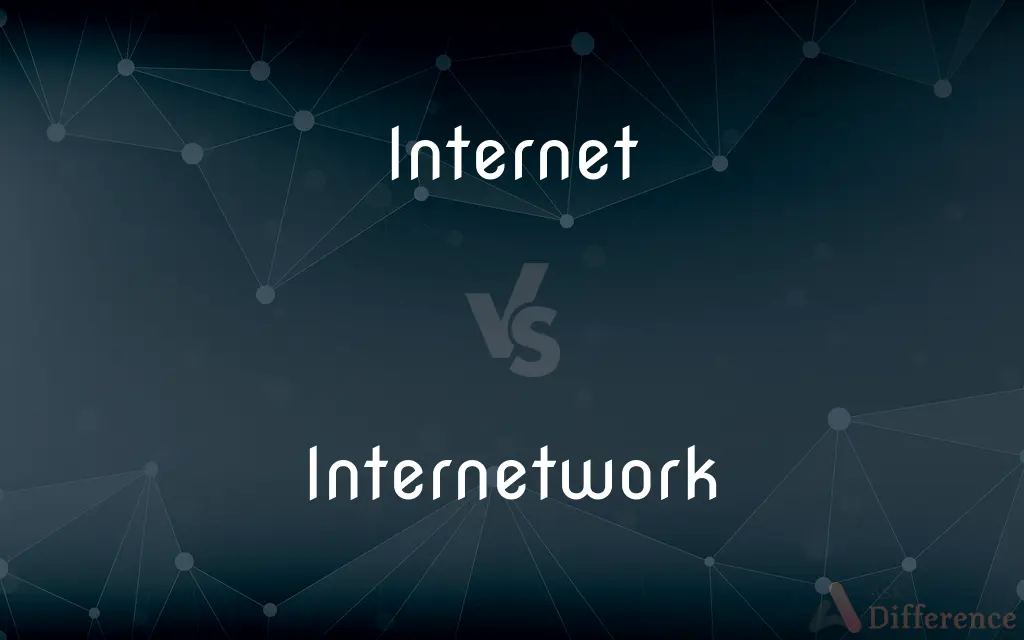Internet vs. Internetwork — What's the Difference?
By Tayyaba Rehman & Fiza Rafique — Updated on March 17, 2024
The Internet is a global system of interconnected computer networks, while an internetwork refers to any connected set of networks that communicate using the Internet Protocol.

Difference Between Internet and Internetwork
Table of Contents
ADVERTISEMENT
Key Differences
The Internet, capitalized, refers specifically to the worldwide collection of networks that use the Internet Protocol Suite (TCP/IP) to serve billions of users globally. It is a network of networks that consists of private, public, academic, business, and government networks, all linked by a broad array of electronic, wireless, and optical networking technologies. In contrast, an internetwork (or "internet" with a lowercase "i") describes any connection of multiple computer networks or devices that are linked together to form a single network. The term internetwork emphasizes the process or architecture behind connecting different networks, without implying the scale or the specific protocols used.
The Internet is characterized by its use of standardized communication protocols, such as TCP/IP, which ensure that diverse networks can communicate efficiently. Whereas, an internetwork might use different protocols, but when referring to IP-based networks, it aligns with the principles of the Internet's architecture. The primary distinction here is between the specific, singular entity known as the Internet and the general concept of network interconnectivity that internetwork represents.
Services and applications like the World Wide Web, email, voice over Internet Protocol (VoIP), and file sharing operate on the Internet, leveraging its global reach and standardized protocols to connect users and information worldwide. On the other hand, the concept of internetworking allows for the creation of any networked connections between more localized or specific groups of networks, not necessarily intended for global or public access.
The development of the Internet was a result of research and development projects in the late 20th century that aimed to build robust, fault-tolerant, and global communication via computers. Internetworking, as a concept, has been integral to this development, representing the technical foundation upon which the Internet was built. It involves the technical practices and protocols that allow for the interconnection of separate and distinct networks into a larger, functional network.
While the Internet has become synonymous with global communication, digital commerce, and the exchange of vast amounts of data, an internetwork might serve a more localized or specialized purpose. For example, a corporate internetwork (often called an intranet) connects various parts of an organization’s IT infrastructure to enable communication and data sharing within the company.
ADVERTISEMENT
Comparison Chart
Definition
Global system of interconnected computer networks.
Any connected set of networks communicating with each other.
Scope
Worldwide, public access.
Can be limited or expansive, private or public.
Protocols
Primarily uses TCP/IP.
May use various protocols, including TCP/IP.
Purpose
Provides global connectivity and access to information and services.
Connects multiple networks for specific or localized purposes.
Examples
World Wide Web, email, VoIP.
Corporate intranets, research networks.
Compare with Definitions
Internet
A global network connecting millions of computers worldwide.
The Internet has revolutionized how we access information and communicate.
Internetwork
Can be built using various networking technologies.
Internetworking involves connecting LANs and WANs using routers and gateways.
Internet
Characterized by its open, decentralized nature.
The Internet's architecture allows for innovative developments in technology and society.
Internetwork
The connection of multiple computer networks via a common routing technology.
An internetwork might consist of a company’s headquarters and its branch offices.
Internet
Offers services like the World Wide Web and email.
Through the Internet, people can share information instantly across the globe.
Internetwork
Allows for data communication among different networks.
Employees can access data across the internetwork securely.
Internet
Uses the Internet Protocol Suite for communication.
TCP/IP protocols enable the Internet to connect diverse computer networks.
Internetwork
Serves specific or localized networking objectives.
A university’s internetwork connects its various campuses and departments for academic purposes.
Internet
The Internet (or internet) is the global system of interconnected computer networks that uses the Internet protocol suite (TCP/IP) to communicate between networks and devices. It is a network of networks that consists of private, public, academic, business, and government networks of local to global scope, linked by a broad array of electronic, wireless, and optical networking technologies.
Internetwork
May use the Internet Protocol, but not exclusively.
An internetwork could employ both IP and non-IP protocols for specific applications.
Internet
Facilitates digital commerce, education, and entertainment.
Online shopping and streaming services depend on the Internet.
Internetwork
An interconnected system of networks, especially computer networks.
Internet
A publicly accessible system of networks that connects computers around the world via the TCP/IP protocol.
Internetwork
A network of networks.
Internet
Alternative case form of Internet
Internetwork
(transitive) To set up as a network of networks.
Internet
(uncountable) Internet access or connection; internet connectivity.
Do you have internet at your place? My internet is down and I want to check my email.
Hello everyone, this is your daily dose of internet.
Internet
(countable)
Internet
Any set of computer networks that communicate using the Internet Protocol; an intranet.
Internet
A fictitious unit of scoring awarded for making outstanding posts on the internet.
Internet
To use the Internet; specifically, to search for information using the Internet.
Having no idea what that means, I am internetting like mad.
Internet
To entwine or link (several things) together, so as to form a network; to interconnect, to network.
Internet
To connect (a computer, an electronic device, etc.) into a computer network (in particular, the Internet).
Internet
A large network{3} of numerous computers connected through a number of major nodes of high-speed computers having high-speed communications channels between the major nodes, and numerous minor nodes allowing electronic communication among millions of computers around the world; - usually referred to as the internet. It is the basis for the World-Wide Web.
Internet
A computer network consisting of a worldwide network of computer networks that use the TCP/IP network protocols to facilitate data transmission and exchange
Common Curiosities
Can an internetwork exist without the Internet?
Yes, an internetwork can function independently of the Internet, connecting multiple networks for specific purposes.
What is an example of an internetwork that is not the Internet?
A corporate intranet connecting various office locations and departments is an internetwork that is not the Internet.
What makes the Internet different from an internetwork?
The Internet is a specific, global network, while an internetwork refers to any connected set of networks, regardless of size.
How do internetworks contribute to the functionality of the Internet?
Internetworks are fundamental to the Internet's structure, allowing different types of networks to connect and communicate.
Can a small business have its own internetwork?
Yes, a small business can create an internetwork to connect its operations across multiple locations or departments.
Is the World Wide Web the same as the Internet?
No, the Web is a service that operates on the Internet, providing access to information through websites and hyperlinks.
Do internetworks always use the Internet Protocol?
While many internetworks use IP for compatibility with the Internet, it's not a requirement for an internetwork.
Why is TCP/IP important for the Internet?
TCP/IP ensures reliable communication and interoperability across the Internet's diverse networked environments.
What challenges do internetworks face?
Security, scalability, and interoperability are major challenges as internetworks connect diverse and sometimes incompatible networks.
What role does routing play in internetworks?
Routing directs data packets across different networks within an internetwork, ensuring they reach their destination.
How has the concept of internetworking evolved with technology?
Internetworking has grown more complex and essential, adapting to new technologies and the expanding scope of networked communications.
How do businesses benefit from creating internetworks?
Internetworks enable businesses to streamline operations, improve communication, and securely share resources across locations.
How do internetworks impact global communication?
By connecting separate networks, internetworks facilitate global communication and information exchange on a scale not possible with isolated networks.
What advancements in internetworking are shaping the future of the Internet?
Developments in protocols, security measures, and network architecture are continually enhancing the efficiency and safety of the Internet.
What is the significance of open standards in the development of the Internet?
Open standards ensure that different networks and technologies can interoperate, fostering innovation and the growth of the Internet.
Share Your Discovery

Previous Comparison
Review vs. View
Next Comparison
Paster vs. PastorAuthor Spotlight
Written by
Tayyaba RehmanTayyaba Rehman is a distinguished writer, currently serving as a primary contributor to askdifference.com. As a researcher in semantics and etymology, Tayyaba's passion for the complexity of languages and their distinctions has found a perfect home on the platform. Tayyaba delves into the intricacies of language, distinguishing between commonly confused words and phrases, thereby providing clarity for readers worldwide.
Co-written by
Fiza RafiqueFiza Rafique is a skilled content writer at AskDifference.com, where she meticulously refines and enhances written pieces. Drawing from her vast editorial expertise, Fiza ensures clarity, accuracy, and precision in every article. Passionate about language, she continually seeks to elevate the quality of content for readers worldwide.














































